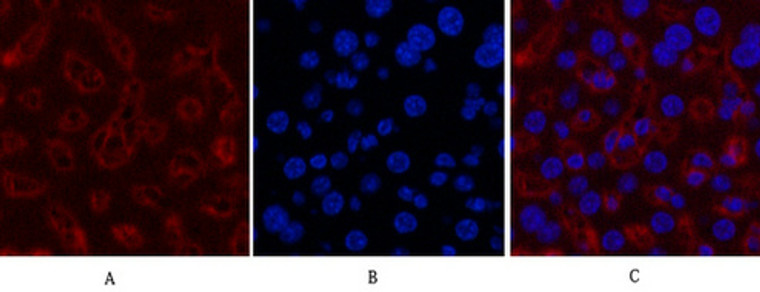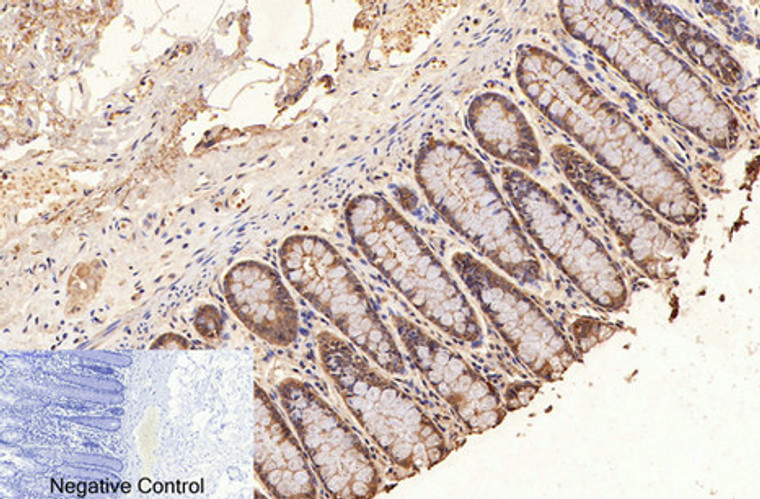-
Western blot analysis of Hela (1), Rat brain (2), Rabbit Muscle (3), Sheep Muscle (4), and Mouse brain (5), diluted at 1:10000.
-
Immunofluorescence analysis of Human-colon tissue. 1, GAPDH monoclonal antibody (2B8) (red) was diluted at 1:200 (4°C, overnight). 2, Cy3 labled Secondary antibody was diluted at 1:300 (room temperature, 50min).3, Picture B: DAPI (blue) 10min. Picture A:Target. Picture B: DAPI. Picture C: merge of A+B
-
Immunofluorescence analysis of Mouse-liver tissue. 1, GAPDH monoclonal antibody (2B8) (red) was diluted at 1:200 (4°C, overnight). 2, Cy3 labled Secondary antibody was diluted at 1:300 (room temperature, 50min).3, Picture B: DAPI (blue) 10min. Picture A:Target. Picture B: DAPI. Picture C: merge of A+B
-
Immunohistochemical analysis of paraffin-embedded Mouse-heart tissue. 1, GAPDH monoclonal antibody (2B8) was diluted at 1:200 (4°C, overnight). 2, Sodium citrate pH 6.0 was used for antibody retrieval (>98°C, 20min). 3, Secondary antibody was diluted at 1:200 (room tempeRature, 30min). Negative control was used by secondary antibody only.
-
Immunohistochemical analysis of paraffin-embedded Rat-kidney tissue. 1, GAPDH monoclonal antibody (2B8) was diluted at 1:200 (4°C, overnight). 2, Sodium citrate pH 6.0 was used for antibody retrieval (>98°C, 20min). 3, Secondary antibody was diluted at 1:200 (room tempeRature, 30min). Negative control was used by secondary antibody only.
-
Immunohistochemical analysis of paraffin-embedded Human-colon tissue. 1, GAPDH monoclonal antibody (2B8) was diluted at 1:200 (4°C, overnight). 2, Sodium citrate pH 6.0 was used for antibody retrieval (>98°C, 20min). 3, Secondary antibody was diluted at 1:200 (room tempeRature, 30min). Negative control was used by secondary antibody only.
-
Western blot analysis of 1 HEK293 2 SW480 3 HEPG2 4 MCF-7 5 mouse brain 6 Rat brain 7 Hela 8 A549 lysates, primary antibody was diluted at 1:5000, 4°C over night, secondary antibody (cat: (NA was diluted at 1:10000, 37°C 1hour.
-
Immunofluorescence analysis of Hela cell. 1, Cyclin D1 Polyclonal Antibody (red) was diluted at 1:200 (4°C overnight). GAPDH monoclonal antibody (2B8) (green) was diluted at 1:200 (4°C overnight). 2, Goat Anti Rabbit Alexa Fluor 594 Catalog: (NA was diluted at 1:1000 (room temperature, 50min). Goat Anti Mouse Alexa Fluor 488 Catalog: (NA was diluted at 1:1000 (room temperature, 50min).












